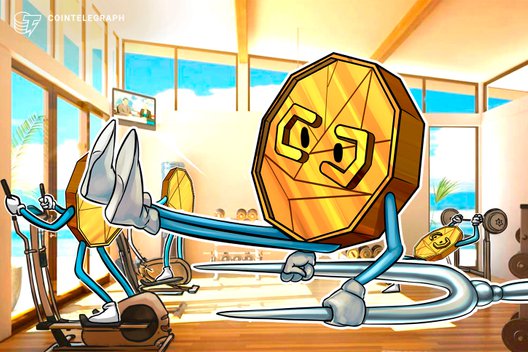Real-world use cases for Nexo, Elrond and Blockstack lure in investors
The ideas of privacy and decentralization have always been the heart of the crypto community. Therefore, when Blockstack announced that it would transition from being a security token to a utility token by launching its new Stacks Blockchain 2.0 on Jan. 14, 2021, it was bound to cause a stir.
After receiving the green light from its compliance team, OKCoin plans to list Blockstack’s STX token and as the first U.S. exchange to do so, the exchange will airdrop $1 million worth of STX.
Airdrops and exchange listings are known to boost cryptocurrency prices and as Cointelegraph reported, STX has already gained 85% in the past nine weeks.
Another token that has been rewarding its investors is Nexo. In late October, the crypto lender announced a bump up in its base rate from 5% to 6% APY and an added bonus of 2% if investors took their payout in NEXO tokens. Given that we live in times where 0% to negative interest rates exist, investors hungry for higher yields appear to have jumped at the opportunity to earn extra interest.
In addition to the interest rate bump, Nexo also unveiled a new loyalty program in November, and on Dec. 3, the company showcased a buyback program to repurchase $12 million worth of NEXO tokens.
All of these decisions are aimed at incentivizing HODLers and they appear to be working in Nexo’s favor as the token price has been in a strong rally since November.

The third token quietly making waves is Elrond’s EGLD. The Elrond network recently announced the launch of its digital wallet and global payments app dubbed Maiar on Jan. 31.
Elrond expects Maiar to gain widespread adoption because the app aims to provide the same features as PayPal, Venmo, and Google Pay but without collecting any personal information and at much lower fixed fees. Although expectations are high, time will only tell how successful the app becomes.
Traders always look for opportunities to make money by taking a calculated risk. A rally backed by fundamentals usually sustains longer than the ones built only on liquidity.
While the three tokens chosen today have a number of fundamental reasons to back up their strong up-moves, can the rally extend further or will the tokens succumb to selling pressure?
Let’s find out!
STX/USD
STX rallied from an intraday low at $0.1401 on Nov. 3 to an intraday high at $0.3171 on Dec. 8, a 126% rally in just over a month. However, the long wick on the Dec. 8 candlestick shows that traders booked profits near the all-time high at $0.32.

The long tail on the Dec. 9 candlestick shows that the bulls purchased at lower levels but could not sustain the recovery. That led to another round of selling today, which has dragged the price to the 20-day exponential moving average ($0.245).
The bulls are currently attempting to defend the 20-day EMA, which suggests that the sentiment remains positive as traders are buying on dips. If the bulls can push the price above $0.29, a retest of $0.32 will be on the cards.
A breakout and close above $0.32 could start the next leg of the uptrend towards $0.35 and then $0.40.
However, the negative divergence on the relative strength index (RSI) suggests that the upside momentum is weakening.
If the price again faces rejection at $0.29 or at $0.32, the bears will try to sink the STX/USD pair below the 20-day EMA. If they succeed, the decline could extend to the 50-day simple moving average at $0.209.
NEXO/USD
NEXO has been on a stellar run in the past month. The token has witnessed a 218% rally from its intraday low at $0.1643886 on Nov. 10 to an intraday high at $0.5241 today.

The upsloping moving averages and the RSI in the overbought territory show that the bulls are in command. There is a minor resistance at $0.52 but if the bulls can push the price above it, the rally could extend to $0.58.
Although the trend favors the bulls, the current pace of the rally is not sustainable. Therefore, traders should exercise caution instead of chasing prices higher.
The NEXO/USD pair may soon witness a correction to the 20-day EMA ($0.36) or enter a trading range. Such a move could attract profit booking from the momentum traders.
However, if the price rebounds off the 20-day EMA, the pair may resume the uptrend. The first sign of weakness will be if the bears sink the price below the 20-day EMA.
EGLD/USD
Elrond’s EGLD is in a bottoming formation and has started to move up in the past few days. The altcoin has rallied from an intraday low at $9.178 on Dec. 2 to an intraday high at $14.68 on Dec. 5, a 60% rally in a short time.

The up-move is facing resistance at $14.68 but even if this level is crossed, the bulls may again hit a barrier at $16. However, the upsloping 20-day EMA ($11) and the RSI close to the overbought zone suggest that the path of least resistance is to the upside.
If buyers can drive the price above the $16 overhead resistance, the rounding bottom pattern will complete. This setup has a target objective of $26.
Even if the price corrects from the current levels, the bulls are likely to buy the dip to the 20-day EMA. If that happens, the EGLD/USD pair will make another attempt to climb above the overhead resistance. If successful, the momentum is likely to pick up.
This positive view will be invalidated if the bears sink and sustain the price below the 20-day EMA. Such a move could again drag the price down to the 50-day SMA at $9.
The views and opinions expressed here are solely those of the author and do not necessarily reflect the views of Cointelegraph. Every investment and trading move involves risk, you should conduct your own research when making a decision.









